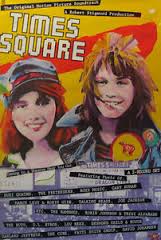
TIMES SQUARE
US, 1980, 106 minutes, Colour.
Trini Alvaredo, Robin Johnson, Tim Curry.
Directed by Allan Moyle.
Times Square is a picture of runaway youth in New York City, the sleazy life in Times Square. However, it is somewhat romanticized in the presentation of the two young girls, Robin Johnson very effective and the streetwise Nicole, Trini Alvarado also very good as the well-educated and spoilt Pamela. The film uses a strong musical score with which its audiences could identify. It also use the role of radio, with Tim Curry as disc jockey commentator looking out on life in the Times Square and being a refuge for the two young runaways.
The film was highly critical of parents, especially Pamela's ambitious father and his raising money for the improvement of Times Square while neglecting or misrepresenting his daughter. The material is more or less as expected: the life of the runaways in a warehouse, taking to the streets, getting jobs in clubs, the music, rebellion, throwing television sets from high buildings, gathering a following as well as the despair and joys of youthful independence. The film was also a portrait of friendship between teenage girls. The film works in the way of a modern fable ? not to be taken too literally, but as a story highlighting social problems and personal problems.
1. Youth oriented entertainment? Youth 1980? A story of runaways, then and now? The ethos of the runaways? The yearning for independence? Parents and authorities? Musical score?
2. The world of New York City especially Times Square and its squalid and sleazy life? A location for runaways? The warehouse, the streets and the clubs?
3. The musical score, the range of songs? The period? Radio, performances, music and lyrics? Protest?
4. The perspective of the film makers on family, parents and children, authority figures, reaction of children? Living on the fringe?
5. Nicki, her wondering the city, her radio? The social workers and their custody? Her rebellion? In Hospital, her behaviour ? eating the flour, reading Nicki's poetry, ridiculing the doctors and their tests? Her escape? Her background, illness, violence, deaths by drowning? Her age and juvenile supervision?
6. The contrast with Pamela, well-educated, with her father on the platform, his story about the film Cuckoo's Nest and misrepresenting her for his purposes? Her writing letters to the radio guru, his reading them, urging her to take a leap of faith and run? In Hospital, reading, fascinated by Nicki's behaviour, writing poetry about her? Nicki inviting her to leave? On the run?
7. The experience of running away, the chase in the hospital, driving the ambulance, carefree? 13 year old girls on the road? How credible? Nicki's living in the warehouse, stealing things, buying clothes? Music, dancing? Going to the club, the interview for the job, refusing to dance topless? Her audition, success in the club? Wondering the streets, encounters with people? The friendship, sharing poetry and the nature of poetry? The dangers in the street? The influence of television and their calling themselves the Sleaze Sisters? Listening to Johnny, the letters? His music? The publicity of their running away? The accusation of kidnapping? Pamela's letter declaring she was not kidnapped but finding herself?
8. Johnny La Guardia and his staff, their writing copy for him? His style, voice? Motivation? On Times Square and looking through his telescope? Above the life of the Square? His talking to youngsters? His work in the studio, the music? Nicole and her visit? Her playing in the studio? His interest in their music? The staff finding them at the club? (And telling Pamela's father)? Nicole and her breakdown, switching her off air? Calling in the authorities? Pamela's attack? His cowardice? Clashes with Pamela's father? At the end, looking down on the concert in Times Square? Sympathetic ? yet an exploitive adult?
9. Pamela's father, his reputation, wealth, changing the face of New York City? His speech and making up the story about his daughter? Taking her to hospital, his power over the doctors? Reaction at her running away, his anger? Question of the police, the media? The clash with Johnny La Guardia and the confrontation? The information about where Pamela was, going to the club and seeing her posing in the mirror, trying to be older than she was, the cigarette etc.? Her running away? The phone call and his wanting her back? Had he changed or not by the experience?
10. The social worker, her understanding of Nicki, her concern, collaboration with trying to get the girls back? Her writing the letter to Pamela about Nicki's health? On Times Square at the end?
11. The change in the two girls, talking and friendship, poetry? Pamela trying to be herself? The letter from Rosie Washington and Nicole trying to kill herself in the river? Unable to? Depressed, with Johnny, her skill with music ?and wanting to be famous, playing in the club with groups, the record? Johnny telling the authorities and her being sedated? Pamela and her exultation to play in the concert? Her making herself up, the other girls listening on the radio, the invitation to come to Time Square and the concert, making themselves up, defying their parents? Nicki and her playing, her speech to the crowd, her acknowledgment of Pamela and her friendship, leaping and disappearing in the square?
12. The adolescent perspective on the children and their behaviour, the antiparent stance? The truth in the fable? Glamour and squalour for runaways? Their ability to cope, stand on their own feet and find themselves?